- Home
- Harlan Coben
One False Move: A Myron Bolitar Novel Page 13
One False Move: A Myron Bolitar Novel Read online
Page 13
Myron said, “Don’t answer.”
“Let me help you, Brenda. Your father didn’t listen to the court order, right? He came after you, didn’t he?”
Brenda said nothing.
“You were his daughter. You disobeyed him. You publicly humiliated him, so much so that he decided to teach you a lesson. And when he came after you—when that big, scary man was going to attack you again—you had no choice. You shot him. It was self-defense, Brenda. I understand that. I would have done the same thing. But if you walk out that door, Brenda, I can’t help you. It moves from something justifiable to coldblooded murder. Plain and simple.”
McLaughlin took her hand. “Let me help you, Brenda.”
The room went still. McLaughlin’s freckled face was totally earnest, the perfect mask of concern and trust and openness. Myron glanced over at Tiles. Tiles quickly diverted his gaze.
Myron didn’t like that.
McLaughlin had laid out a neat little theory. It made sense. Myron could see why they would believe it. There was bad blood between father and daughter. A well-documented history of abuse. A court order …
Hold the phone.
Myron looked back over at Tiles. Tiles would still not meet his eyes.
Then Myron remembered the blood on the shirt in the locker. The cops didn’t know about that, couldn’t know about it.…
“She wants to see her father,” Myron blurted out.
Everybody looked at him. “Excuse me?”
“His body. We want to see Horace Slaughter’s body.”
“That won’t be necessary,” McLaughlin said. “We’ve positively identified him through fingerprints. There’s no reason to put—”
“Are you denying Miss Slaughter the opportunity to view her father’s body?”
McLaughlin backpedaled a bit. “Of course not. If that’s what you really want, Brenda—”
“That’s what we want.”
“I’m speaking to Brenda—”
“I’m her attorney, Detective. You speak to me.”
McLaughlin stopped. Then she shook her head and turned to Tiles. Tiles shrugged.
“Okay then,” McLaughlin said. “We’ll drive you over.”
The Bergen County Medical Examiner’s Office looked like a small elementary school. It was one level, red brick, right angles, and as unassuming a building as one could construct, but then again, what did you want in a morgue? The waiting room chairs were molded plastic and about as comfortable as a pinched nerve. Myron had been here once before, not long after Jessica’s father had been murdered. The memory was not a pleasant one.
“We can go in now,” McLaughlin said.
Brenda stayed close to Myron as they all walked down a short corridor. He put his arm around her waist. She moved in a touch. He was comforting her. He knew that. He also knew that it shouldn’t have felt so right.
They entered a room of gleaming metal and tile. No big storage drawers or anything like that. Clothes—a security guard’s uniform—was in a plastic bag in one corner. All the instruments and utensils and what-have-you’s were in another corner, covered by a sheet. So was the table in the center. Myron could see right away that the body underneath it belonged to a big man.
They paused at the door before gathering around the gurney. With minimum fanfare, a man—Myron assumed he was the medical examiner—pulled the sheet back. For the briefest of moments, Myron thought that maybe the cops had screwed up the ID. It was a whimsical hope, he realized, not anything based on fact. He was sure it ran through every person’s mind who came here to identify someone, even when he knew the truth, a last gasp, a fantasy that a wonderful, beautiful mistake had been made. It was only natural.
But there was no mistake here.
Brenda’s eyes filled. She tilted her head and screwed up her mouth. Her hand reached out and brushed the still cheek.
“That’s enough,” McLaughlin said.
The medical examiner started pulling the sheet back. But Myron reached his hand out and stopped him. He looked down at the remains of his old friend. He felt tears sting his own eyes, but he forced them back. Now was not the time. He had come here for a purpose.
“The bullet wound,” Myron said, his voice thick. “It’s in the back of the head?”
The medical examiner glanced at McLaughlin. McLaughlin nodded. “Yes,” the medical examiner said. “I cleaned him up when I heard you were coming.”
Myron pointed to Horace’s right cheek. “What’s that?”
The medical examiner looked nervous. “I have not yet had the time to properly analyze the body.”
“I didn’t ask you for an analysis, Doctor. I asked you about this.”
“Yes, I understand that. But I do not wish to make any suppositions until I perform a complete autopsy.”
“Well, Doctor, it’s a bruise,” Myron said. “And it happened premortem. You can tell by the lividity and coloring.” Myron had no idea if that was true, but he ran with it. “His nose also appears to be broken, does it not, Doctor?”
“Don’t answer that,” McLauglin said.
“He doesn’t have to.” Myron starting leading Brenda away from the shell that was once her father. “Nice try, McLaughlin. Call us a taxi. We’re not saying another word to you.”
When they were alone outside, Brenda said, “Do you want to tell me what that was all about?”
“They were trying to con you.”
“How?”
“For the sake of argument, let’s say you did murder your father. The police are questioning you. You’re nervous. Suddenly they give you the perfect out.”
“That self-defense stuff.”
“Right. Justifiable homicide. They pretend they’re on your side, that they understand. You as the killer would jump at the chance, right?”
“If I were the killer, yeah, I guess I would.”
“But you see, McLaughlin and Tiles knew about those bruises.”
“So?”
“So if you shot your father in self-defense, why was he beaten beforehand?”
“I don’t understand.”
“Here’s how it works. They get you to confess. You follow their lead, come up with a story about how he attacked you and how you had to shoot him. But the problem is, if that’s the case, where did the facial bruises come from? All of a sudden, McLaughlin and Tiles produce this new physical evidence that contradicts your version of the events. So what are you left with? A confession you can’t retract. With that in hand, they use the bruises to show it wasn’t self-defense. You’ve screwed yourself.”
Brenda chewed that over. “So they figure someone beat him right before he was killed?”
“Right.”
She frowned. “But do they really believe I could have beaten him up like that?”
“Probably not.”
“So how are they figuring?”
“Maybe you surprised him with a baseball bat or something. But more likely—and this is the tricky part—they think you had an accomplice. You remember how Tiles checked my hands?”
She nodded.
“He was looking for bruised knuckles or some other telltale sign of trauma. When you punch somebody, your hand usually shows it.”
“And that’s also why she asked me about a boyfriend?”
“Right.”
The sun was starting to weaken a bit. Traffic whizzed by. There was a parking lot across the street. A sprinkling of men and women in business suits trudged to their cars after a day of unnatural office light, their faces pale, their eyes blinking.
“So they believe that Dad was beaten right before he was shot,” she said.
“Yes.”
“But we know that it probably isn’t true.”
Myron nodded. “The blood in the locker. My guess is, your father was beaten a day or two before. Either he got away or the beating was just a warning. He went to his locker at St. Barnabas to clean up. He used a shirt to stop the blood flowing out of his nose. Then he ran away.”
“Yes.”
“Shouldn’t we tell the police about the bloody shirt?”
“I’m not sure. Think about it a second. The cops firmly believe you did it. Now you produce a shirt with your dad’s blood on it. Is that going to help us or hurt us?”
Brenda nodded and suddenly turned away. Her breathing became funny again. Too much too fast, Myron thought. He stayed back and gave her a little space. His heart started swelling up. Mother and father both gone, no sisters or brothers. What must that feel like?
A taxi pulled up a few minutes later. Brenda faced him again.
“Where do you want to be dropped off?” Myron asked. “A friend’s house? Your aunt’s?”
She thought about it. Then she shook her head and met his gaze. “Actually,” she said, “I’d like to stay with you.”
The taxi pulled up to the Bolitar house in Livingston.
“We can go somewhere else,” he tried again.
She shook her head. “Just do me one favor.”
“What?”
“Don’t tell them about my father. Not tonight.”
He sighed. “Yeah, okay.”
Uncle Sidney and Aunt Selma were already there. So were Uncle Bernie and Aunt Sophie and their boys. Other cars pulled up as he paid the taxi driver. Mom sprinted down the driveway and hugged Myron as though he’d just been released by Hamas terrorists. She also hugged Brenda. So did everyone else. Dad was in the back at the barbecue. A gas grill now, thank goodness, so Dad could stop loading on the lighter fluid with a hose. He wore a chef’s hat somewhat taller than a control tower and an apron that read REFORMED VEGETARIAN. Brenda was introduced as a client. Mom quickly grabbed her away from Myron, threading her arm through Brenda’s, and led her into the house for a tour. More people came. The neighbors. Each with a pasta salad or fruit salad or something. The Dempseys and the Cohens and the Daleys and the Weinsteins. The Brauns had finally surrendered to the warm allure of Florida, and a couple younger than Myron with two kids had moved in. They came over too.
The festivities began. A Wiffle ball and bat were produced. Teams were chosen. When Myron swung and missed, everyone fell down as though from the breeze. Funny. Everyone talked with Brenda. They wanted to hear about the new women’s league, but they were far more impressed when they heard Brenda was going to be a doctor. Dad even let Brenda take over the grill for a while, a move for Dad tantamount to donating a kidney. The smell of charred foods filled the air. Chicken and burgers and hot dogs from Don’s deli (Mom bought her hot dogs only from Don) and shish kebabs and even a few salmon steaks for the health-conscious.
Myron kept meeting Brenda’s eye. Brenda kept smiling.
Kids, all dutifully wearing helmets, parked their bikes at the end of the driveway. The Cohens’ kid had gotten an earring. Everyone ribbed him about it. He slumped his head and smiled. Vic Ruskin gave Myron a stock tip. Myron nodded and promptly forgot it. Fred Dempsey grabbed a basketball from the garage. The Daley girl picked teams. Myron had to play. So did Brenda. Everyone laughed. Myron downed a cheeseburger between points. Delicious. Timmy Ruskin fell down and cut his knee. He cried. Brenda bent down and examined the cut. She put on a Band-Aid and smiled at Timmy. Timmy beamed.
Hours passed. Darkness crept in slowly as it does in suburban summer skies. People began to drift home. Cars and bikes faded away. Fathers threw their arms around sons. Little girls rode home on shoulders. Everyone kissed Mom and Dad good-bye. Myron looked at his parents. They were the only original family left in the neighborhood now, the surrogate grandparents of the block. They suddenly looked old to Myron. That scared him.
Brenda came up behind him. “This is wonderful,” she said to him.
And it was. Win might poke fun at it. Jessica did not care for scenes like these—her own family had created the perfect Rockwellian facade to hide the rot below—and rushed back to the city as though it held an antidote. Myron and Jess often drove back from such events in total silence. Myron thought about that. And he thought again what Win had said about taking leaps of faith.
“I miss your father,” Myron said. “I haven’t talked to him in ten years. But I still miss him.”
She nodded. “I know.”
They helped clean up. Not much to it. They’d used only paper plates and cups and plastic utensils. Brenda and Mom laughed the whole time. Mom kept sneaking glances at Myron. The looks were a little too knowing.
“I always wanted Myron to be a doctor,” Mom said. “Isn’t that a shock? A Jewish mother who wants her son to be a doctor?”
Both women laughed.
“But he faints at the sight of blood,” Mom continued. “Can’t stand it. Myron wouldn’t even go to an R-rated movie until he was in college. Slept with a night-light until he was—”
“Mom.”
“Oh, I’m embarrassing him. I’m your mother, Myron. I’m supposed to embarrass you. Isn’t that right, Brenda?”
“Definitely, Mrs. Bolitar.”
“For the tenth time, it’s Ellen. And Myron’s father is Al. Everyone calls us El Al. Get it? Like the Israeli airline.”
“Mom.”
“Shush, you, I’m going. Brenda, you’ll stay tonight? The guest room is all ready for you.”
“Thank you, Ellen. That would be very nice.”
Mom turned. “I’ll leave you kids alone.” Her smile was too happy.
The backyard fell silent. A full moon was the only source of illumination. Crickets hummed. A dog barked. They started walking. They talked about Horace. Not about the murder. Not about why he vanished or about Anita Slaughter or FJ or the league or the Bradfords or any of that. Just about Horace.
They reached Burnet Hill, Myron’s elementary school. A few years ago the town had closed down half the building because of its proximity to high-tension electromagnetic wires. Myron had spent three years under those wires. Might explain a few things.
Brenda sat on a swing. Her skin glistened in the moonlight. She started swinging, kicking her legs high. He sat on the swing next to her and joined her in the air. The metal apparatus was strong, but it still started swaying a bit under their onslaught.
They slowed.
“You haven’t asked about the assault,” she said.
“There will be time.”
“It’s a pretty simple story,” she said.
Myron said nothing, waited.
“I came to Dad’s apartment. He was drunk. Dad didn’t drink much. When he did, it really hit him. He was barely coherent when I opened the door. He started cursing me. He called me a little bitch. Then he pushed me.”
Myron shook his head, not sure what to say.
Brenda stopped the swing. “He also called me Anita,” she said.
Myron’s throat went dry. “He thought you were your mother?”
Brenda nodded. “He had such hate in his eyes,” she said. “I’ve never seen him look like that.”
Myron stayed still. A theory had been slowly taking shape in his mind. The blood in the locker at St. Barnabas. The call to the lawyers and to the Bradfords. Horace’s running away. His being murdered. It all sort of fit. But right now, it was just a theory based on the purest of speculation. He needed to sleep on it, marinate the whole thing in the brain fridge for a while, before he dared articulate it.
“How far is it to the Bradfords’ place?” Brenda asked.
“Half a mile maybe.”
She looked away from him. “Do you still think my mom ran away because of something that happened in that house?”
“Yes.”
She stood. “Let’s walk over there.”
“There’s nothing to see. A big gate and some shrubs.”
“My mother walked through those gates for six years. That’ll be enough. For now.”
They took the path between Ridge Drive and Coddington Terrace—Myron could not believe it was still here after all these years—and made a right. The lights on the hill were visible from h
ere. Not much else. Brenda approached the gate. The security guard squinted at her. She stopped in front of the iron bars. She stared for several seconds.
The guard leaned out. “Can I help you, ma’am?”
Brenda shook her head and moved away.
They got back to the house late. Myron’s father was feigning sleep in the recliner. Some habits die hard. Myron “woke” him up. He startled to consciousness. Pacino never overacted this much. He smiled good night at Brenda. Myron kissed his father on the cheek. The cheek felt rough and smelled faintly of Old Spice. As it should.
The bed was made in the downstairs guest room. The maid must have been in that day because Mom stayed away from domestic chores as though they were radioactive. She had been a working mother, one of the most feared defense attorneys in the state, since the days before Gloria Steinem.
His parents saved toiletry bags from first-class flights. He gave one to Brenda. He also found her a T-shirt and pajama bottoms.
When she kissed him hard on the mouth, he felt every part of him stir. The excitement of a first kiss, the brand-newness of it, the wondrous taste and smell of her. Her body, substantial and hard and young, pressed against his. Myron had never felt so lost, so heady, so weightless. When their tongues met, Myron felt a jolt and heard himself groan.
He pulled back. “We shouldn’t. Your father just died. You—”
She shut him up with another kiss. Myron cupped the back of her head with his palm. He felt tears come to his eyes as he held on.
When the kiss ended, they held each other tightly, gasping.
“If you tell me I’m doing this because I’m vulnerable,” she said, “you’re wrong. And you know you’re wrong.”
He swallowed. “Jessica and I are going through a rough patch right now.”
“This isn’t about that either,” she said.
He nodded. He did know that. And after a decade of loving the same woman, maybe that was what scared him most of all. He stepped back.
“Good night,” he managed.
Myron rushed downstairs to his old room in the basement. He crawled under the sheets and pulled them up to his neck. He stared up at the frayed posters of John Havlicek and Larry Bird. Havlicek, the old Celtic great, had been on his wall since he was six years old. Bird had joined him in 1979. Myron sought comfort and maybe escape in his old room, in surrounding himself with familiar images.

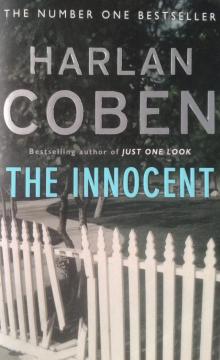 The Innocent
The Innocent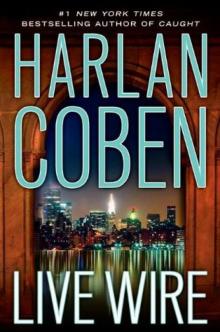 Live Wire
Live Wire Play Dead
Play Dead Drop Shot
Drop Shot Seconds Away
Seconds Away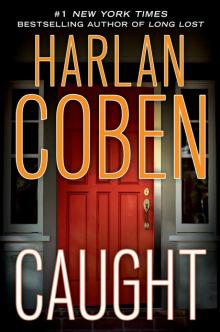 Caught
Caught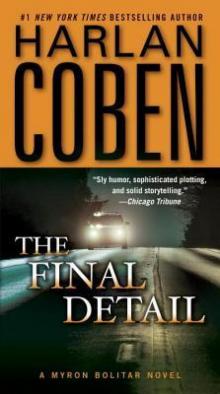 The Final Detail
The Final Detail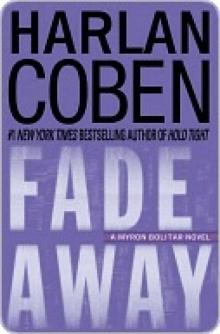 Fade Away
Fade Away Home
Home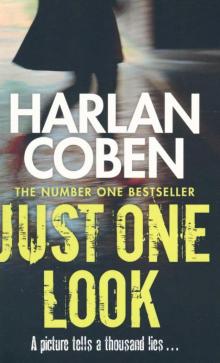 Just One Look
Just One Look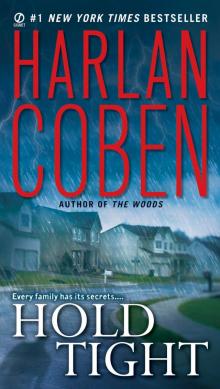 Hold Tight
Hold Tight Fool Me Once
Fool Me Once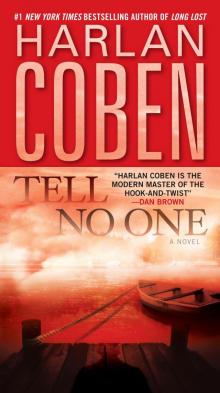 Tell No One
Tell No One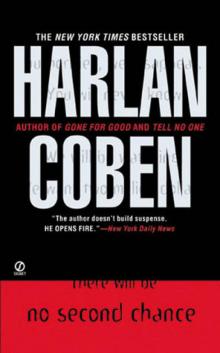 No Second Chance
No Second Chance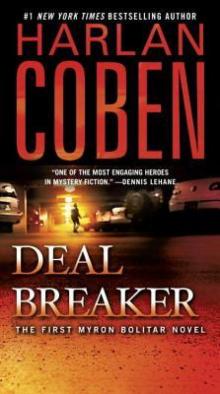 Deal Breaker
Deal Breaker Long Lost
Long Lost One False Move
One False Move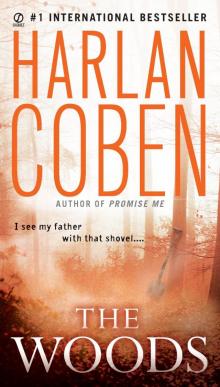 The Woods
The Woods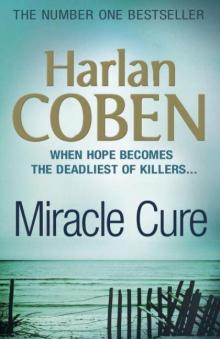 Miracle Cure
Miracle Cure Found
Found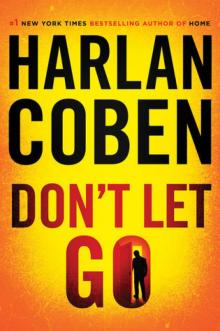 Don't Let Go
Don't Let Go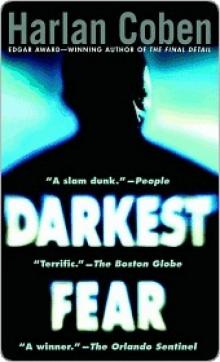 Darkest Fear
Darkest Fear The Stranger
The Stranger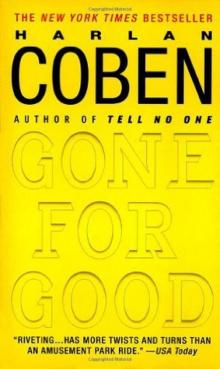 Gone for Good
Gone for Good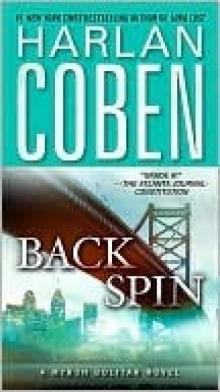 Back Spin
Back Spin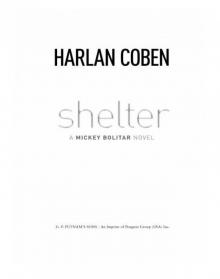 Shelter
Shelter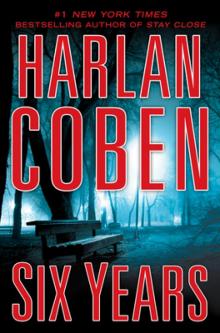 Six Years
Six Years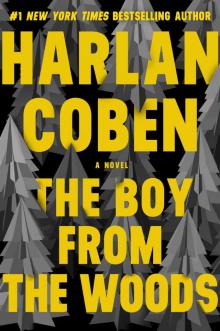 The Boy from the Woods
The Boy from the Woods Missing You
Missing You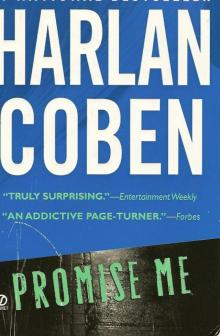 Promise Me mb-8
Promise Me mb-8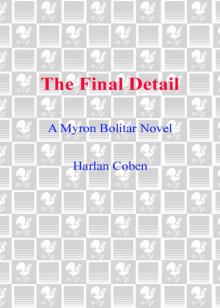 The Final Detail: A Myron Bolitar Novel
The Final Detail: A Myron Bolitar Novel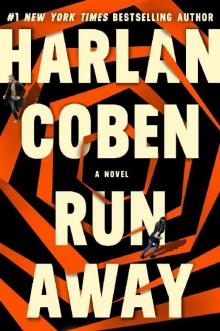 Run Away
Run Away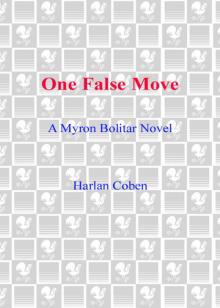 One False Move: A Myron Bolitar Novel
One False Move: A Myron Bolitar Novel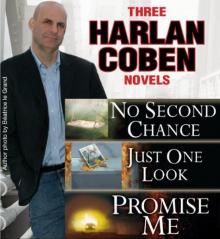 Three Harlan Coben Novels
Three Harlan Coben Novels the Woods (2007)
the Woods (2007) Tell No One (2001)
Tell No One (2001) the Innocent (2005)
the Innocent (2005)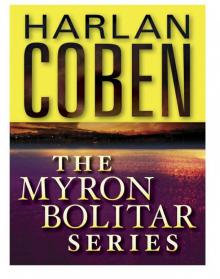 The Myron Bolitar Series 7-Book Bundle
The Myron Bolitar Series 7-Book Bundle Gone for Good (2002)
Gone for Good (2002) Caught (2010)
Caught (2010) Hold Tight (2008)
Hold Tight (2008)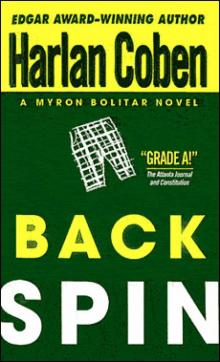 04 - Back Spin
04 - Back Spin Miracle Cure (1991)
Miracle Cure (1991) Harlan Coben 3 Novel Collection
Harlan Coben 3 Novel Collection Just One Look (2004)
Just One Look (2004)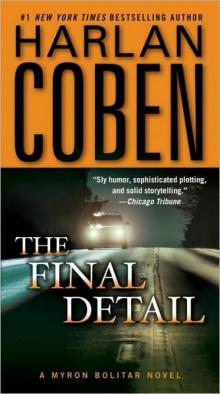 The Final Detail mb-6
The Final Detail mb-6 Play Dead (2010)
Play Dead (2010)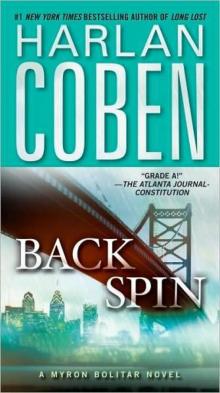 Back Spin mb-4
Back Spin mb-4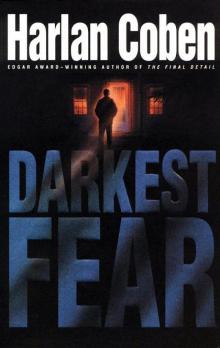 Darkest Fear mb-7
Darkest Fear mb-7